In general, if the water is safe for you to drink, it is also safe for your pet. Cats, like other species, are more likely to get leptospirosis via stagnant water polluted by another sick animal.
You should not be using distilled water since it is acidic and may reduce your cat’s urine pH below 6, resulting in stones or crystals.
It’s vital to note that rainwater isn’t always suitable to drink for your cat. When rainfall falls on the ground, it comes into touch with a number of pollutants or compounds that are not safe to drink.
Giardia may be contracted by your cat consuming contaminated food or water. Toxins, hostile bacteria, bugs, and other contaminants must be avoided. Here is our guideline to why rainwater should be avoided for your pet!
Key Takeaways
- Cats can be scared by thunderstorms and other loud noises.
- Rainwater should generally not be given to cats to drink because it can contain pollutants and other contaminants.
- Cats should be provided with clean, fresh water to drink.
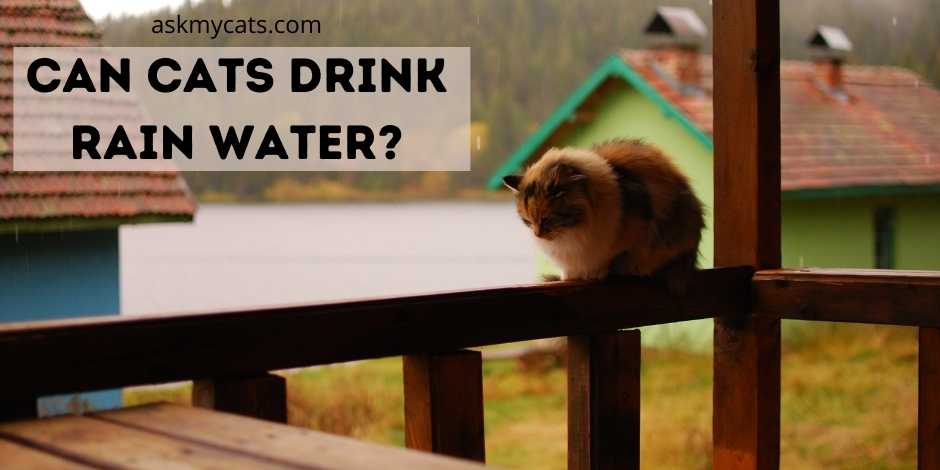

Give Your Cat the Perfect Day
Get the Free Ebook!
Why Does My Cat Drink Rain Water?
Your cat drinks rain water because the rainwater tends to be cooler than normal tap water and it soothes your cat’s throat in warm temperature conditions.
Your cat should only drink the rainwater coming straight from the clouds. You should strictly consider it polluted if it comes into contact with the ground or your roof. Do not give it to your cat to drink.
Cats prefer to consume filthy water when they hate the water, bowl, or location of the bowl. Cats in the wild will not drink where they hunt.
The animal corpses would pollute the water and make the cat ill. Cats detest drinking from bowls when their delicate whiskers come into contact with the brim.
Rainwater may give cats worms. Guinea worms and tapeworms are two of the most prevalent worm species. Flies and fleas thrive in stagnant rainwater, which is especially common in warm regions.
On the stagnant water, flies and other pests breed. The cat has no other option if that is the sole source of hydration available till the owners return.
Even if your cat refuses to drink it, it’s always a good idea to give clean, safe water. You may make this choice more attractive by following the suggestions above.
Still, water may elicit an instinctive dislike. Cats in the wild will generally drink only flowing water, which helps them avoid becoming unwell. Alternatively, it’s possible that your cat has discovered that rainwater or water from a faucet is colder.
Every day, your cat needs 3.5 to 4.5 ounces of water per 5 pounds of body weight. For example, if your cat weighs ten pounds, it should drink roughly half a bottle of water every day (between 7-9 ounces). You may find that your cat doesn’t drink as much water if it consumes a lot of wet food.
Must Read: Do Cats Like Rain? Know The Secret
Why Do Cats Like Drinking Rain Water?
Cats like to drink rainwater because they hate the smell of excess chlorine in the water which you are providing them.
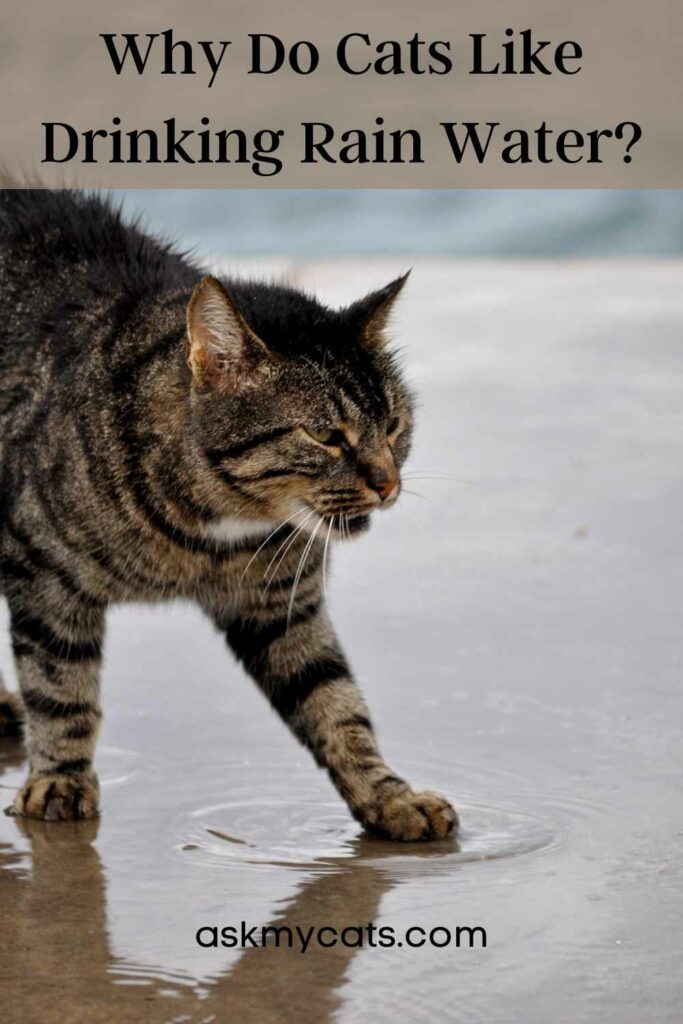
It’s just as essential for our cats to keep hydrated as it is for us. Depending on what they are fed, each cat will drink a different quantity of water. If you’re providing a wet diet (meat), they’ll get a lot of water from the meal, so they won’t need to drink as much.
Cats who eat dry food (such as cat biscuits) drink more water. Don’t panic if you don’t notice your cat drinking; it’s possible they’re drinking from a water source outside or from their water dish inside when you’re not looking!
Cats are physiologically trained not to drink water that is close to their feeding or toileting area; this is considered to be an instinctual response to the risk of polluting their water with germs. If your cat drinks more, try relocating the water bowl away from the food bowl and litter tray.
Wash the bowl every day, thoroughly clean it, and replace it with new water.
When drinking, cats prefer not to have their whiskers contact the edge of the dish, therefore choose a bowl with a broad brim.
Plastic bowls can contaminate the water, therefore cats prefer to drink from ceramic, glass, or metal bowls.
Some cats prefer to drink from a natural water source outside, maybe because the taste of chlorine bothers them. You might gather rainwater and give it to your cat to drink.
Cats prefer to drink from a flowing water source, such as a tap or a fountain; you can buy cat water fountains, which some cats enjoy (but not all!).
In the event that a favorite outdoor drinking source becomes inaccessible, water should always be available indoors.
Experiment with different sorts of drinking containers and their locations. Check out where and what your cat loves to drink from – you might be surprised!
Interesting Read: Do Cats Sleep More When It Rains?
Is It Safe For Cats To Drink Rain Water?
Rainwater would be only suitable for drinking for cats if it is gathered directly from the sky and in a minimum level of polluted environment.
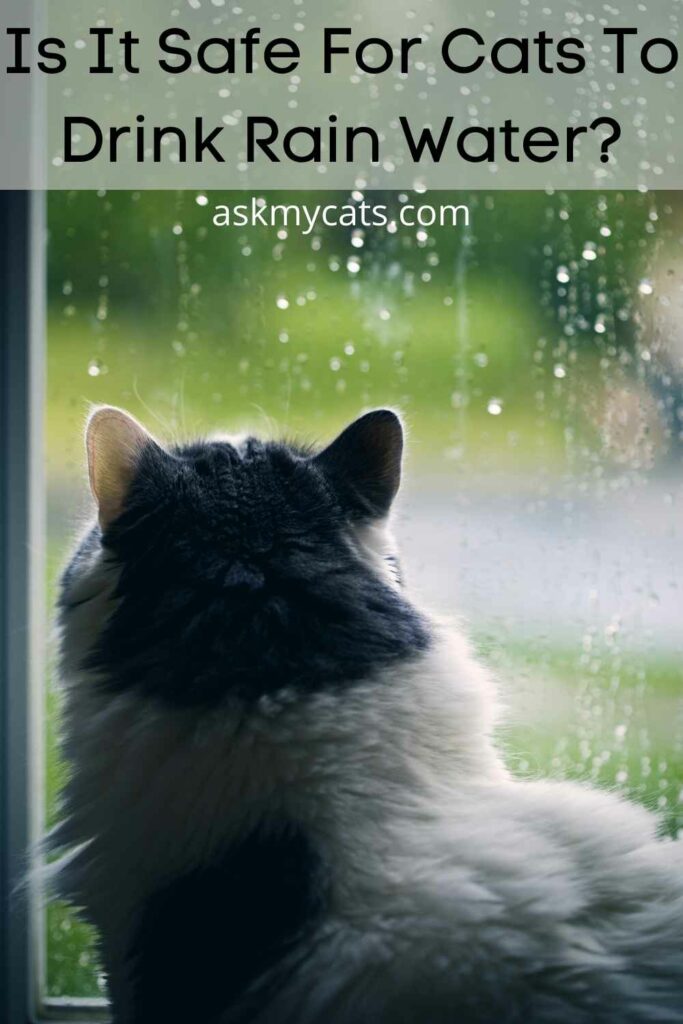
After being evaporated by the sun, rainwater is distilled and cleaned. Rainwater, on the other hand, takes up pollution from the air as it falls.
Collecting rainwater is not recommended if you reside in a major city or near a plant. It will be hazardous due to pollution. If you reside in a clean-air location, you should carefully collect rainwater.
Rain is pure water, therefore it’s okay to drink unless you’re using galvanized rain buckets, which you should avoid.
Zinc coating on galvanized vessels is harmful to cats and dogs in high quantities. Choose a ceramic, steel, or glass bowl if you’re feeding your pet water.
Drinking contaminated water may make cats ill. Leptospirosis is the most frequent infection that cats contract. It’s a bacterial illness that can be found in:
- Environments in the subtropics
- Sluggish, marshy waters
- Areas that have been heavily flooded, such as crop farms
Rainwater is generally higher in oxygen and nutrients than tap water. It has the following characteristics:
- Calcium
- Iron
- Sodium
This enhances the water, giving it a more organic flavor and fragrance. This is preferred by cats over drinking water from humans. Our water is generally chemically treated and filtered excessively.
Minerals are obtained by cats in the wild from the waters found in rivers and streams. Domestic cats may be deficient in nutrients depending on their diet. Nonetheless, their bodies require it just as much as ours.
Cats will be drawn to the earthy scent of rainwater because of the microorganisms it carries. It’s absolutely OK for the cat to sip rainwater as long as the water isn’t toxic to consume.
This is particularly true if the cat was once wild. Because it lives on the streets, it will have a stronger immune system.
Infected cats are more likely to be found outside than inside.
According to the Journal of Comparative Pathology, adolescent cats that have not been immunized are at the greatest danger.
This is especially true for individuals who enjoy being outside in the rain. Cats that dwell in locations where there are other animals are likewise vulnerable. Drinking the urine of an infected animal can spread the illness.
Rain water can be a convenient source of hydration for outdoor cats, but it is not always safe. Rain water can become contaminated with pollutants and toxins, and standing water can harbor bacteria and parasites that can cause illness in cats.
It’s important to provide your cat with a clean, safe water source, whether it be from a bowl or a water fountain.
Dr. Jennifer Coates, DVM
Must Read: Why Do Cats Go Crazy When It Rains?
Why Does My Cat Only Drink Rainwater?
Your cat only drinks rainwater because he is enjoying the taste of it and loves every bit of it.
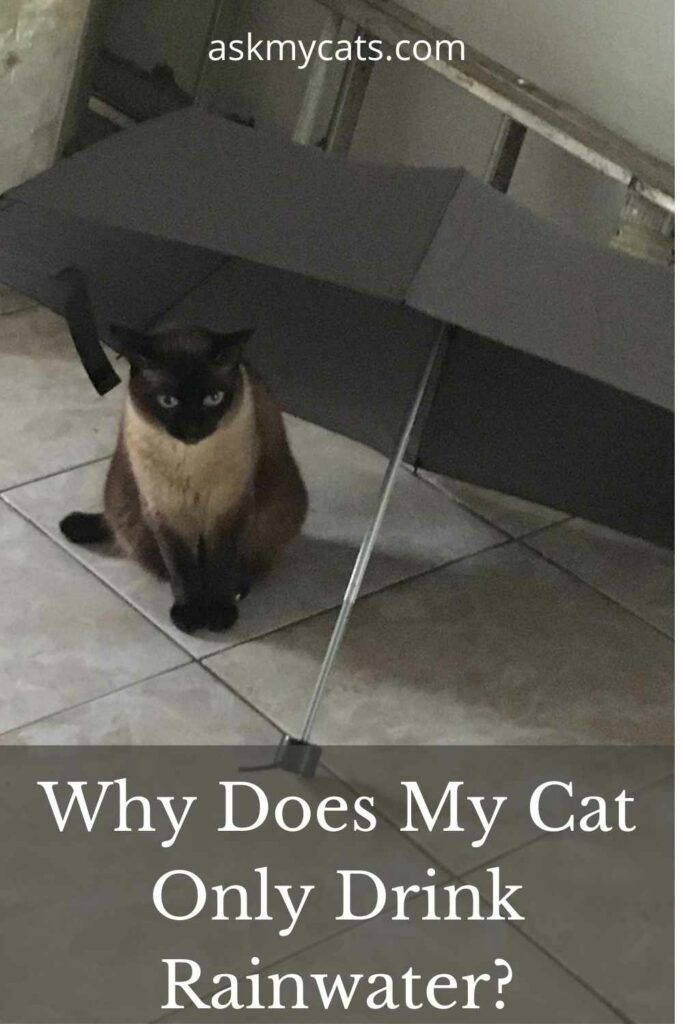
Water sources that are too near to where cats eat are naturally avoided by cats. The carcasses of animals hunted by cats in the wild deteriorate and rot.
Cats are aware that water sources near the bodies of deceased animals may carry germs. As a result, people seek out other places to drink.
It’s possible that your cat is dissatisfied with the size or shape of his water bowl. It might be too tiny, too big, or in a location that is too low or too high for them to safely access. Cats are renowned for being water snobs, and no one knows why.
Cats like flowing water, which may be an evolutionary response to the fact that standing water in the environment may not be safe to drink. In the outdoors, running water is usually cleaner and tastes better.
Consider getting a cat water fountain for her to sip from if she appears to enjoy rushing water. The see-through glass in the large 84-ounce reservoir lets you know when it’s time to refill. Cats are drawn to the brilliant yellow flower waterfall, which invites them to investigate and drink.
They don’t mind having a water dish close to their meal, although they will usually avoid it. It’s a natural reaction. They will drink the water if you arrange water dishes throughout the home.
Outdoor cats will drink from a puddle if it is their sole source of water. It is critical that cats have constant access to fresh water.
Cats are self-reliant, independent creatures, but are you sure your cat will turn down the lovely, clean water you give simply to prove to you that it can exist without you? Even if it is fully competent in capturing mice, Cat does not reject the food you offer.
Chemicals are commonly used to treat tap water, and it is frequently chlorinated to the point where a cat can detect it. Cats’ noses are considerably more sensitive than humans, and many cats find this chemical odor revolting.
In the eyes of a cat, stale water in puddles and pools has a considerably more appealing odor. Although puddles are full of rotting plants and bacteria, cats like this organic soup.
Cats are repulsed by the stench of detergents, as well as the off-putting odor of chemicals in tap water. So, when you clean your cat’s water bowl often for hygienic reasons, the detergent you use discourages your cat from drinking from it.
If you use the same detergent to clean your cat’s food dish, why isn’t the detergent’s odor repulsive to your feline companion? This is due to the fact that the fish or meat has a stronger odor than the detergent.
The combination of the two disagreeable scents in the water bowl, the chemicals in the tap water, and the detergent mean that your cat will only drink from the water bowl if there is no other option.
Is It Healthier To Give Cat Rainwater Instead Of Tap Water?
It is not healthy for a cat to drink rainwater instead of tap water daily because rainwater can become polluted and contaminated with harmful chemicals from the environment.
Giving your cats rainwater is unlikely to create any difficulties, according to experts. Rainwater minerals (calcium, magnesium, and iron) should not cause any health problems.
Some vets, however, advise against feeding untreated tap water to cats and dogs, and it’s not because of the minerals. Holistic veterinarians, for example, think that chemicals added by municipalities during the water treatment process, like as chlorine and fluoride should not be consumed by cats.
A water softener removes hard minerals from your water and replaces them with sodium ions if you have one installed in your house.
The amount of sodium added to your home’s water is determined by the hardness of the water to begin with. However, the amount is usually rather little.
Even so, if your veterinarian has advised your dog or cat to eat a low-sodium diet, this is something to think about.
Some people dislike the taste of softened water, and some pets dislike it as well. If your cat doesn’t appear to be drinking soft water, you may want to switch to something different to keep them healthy and hydrated.
Contaminants are not filtered by water softeners. If you give your pet tap water, it is likely to include contaminants other than pure H2O, such as the chlorine described previously.
There are plenty of alternative options if you’re worried about your dogs drinking both hard and soft water.
Shouldn’t we provide the same quality of water to our cats and dogs as we do to our family members?
It’s reasonable if you have worries about pouring bottled water into your dog’s bowl. Investing in a reverse osmosis (R.O.) drinking water system is a superior choice.
R.O. water is some of the greatest drinking water available, and it’s a great way to ensure that everyone in the family (even the furry ones) has access to clean, tasty water. Water softeners do not filter out additives and pollutants, but ROs do.
Interesting Read: Why Is My Cat Sitting Outside In The Rain?
Although we all require water to exist, it is well-acknowledged that various animals have developed specialized systems to deal with water intake and homeostasis.
The domestic cat is known to have physiological features that aid in fluid balance; for example, cats can withstand acute fluid losses of up to 20% of their body weight quite well. They do, however, have the potential to make extremely concentrated urine 2 to preserve bodily fluid if needed.
Fresh tap water was the most common source of water; if other options were available (e.g., filtered tap water, still mineral water, rainfall), the cats preferred tap water (which is of extremely high quality in Germany and Austria), however outdoor cats also enjoyed rainwater.
In addition to water, 27% of pet owners offered their cats additional fluids to drink, the most common of which was milk or “cat milk” (lactose-free milk).
Outdoor cats utilized substantially more water sources than indoor cats, despite the fact that more than half of pet owners (52%) supplied several water sources.
Water points in rooms other than the one where the meal bowl was situated were favored if there were numerous alternatives. This was true for both indoor and outdoor cats. Despite this, a water bowl was put immediately next to the meal bowl in 41% of families.
Interesting Read: Where Do Stray Cats Go When It Rains?
Potential Benefits & Risks Of Rainwater For Cats
| Benefits | Description |
|---|---|
| Hydration | Rainwater can provide an additional source of hydration for cats, especially if they are outdoors and do not have access to fresh, clean water. |
| Natural minerals | Rainwater may contain trace amounts of minerals and nutrients that can be beneficial for cats, such as calcium and magnesium. |
| Risks | Description |
|---|---|
| Contamination | Rainwater can become contaminated with pollutants and toxins, such as pesticides, herbicides, and heavy metals, if it falls on contaminated surfaces or passes through polluted air. Cats that drink contaminated rainwater may be at risk for illness or poisoning. |
| Bacterial infections | Rainwater that has been collected in puddles or standing water may contain bacteria or parasites that can cause illness in cats. |
Frequently Asked Questions
Is rainwater safe to drink straight from the sky?
As long as it’s clean, there’s nothing intrinsically dangerous or wrong with drinking rainwater. Rainwater is, in fact, the major supply of drinking water for many communities across the world. However, not all rainwater is drinkable.
What kind of water should cats drink?
We recommend filtered tap water or spring water for drinking. In general, if the water is safe for you to drink, it is safe for your pet to drink as well. Use distilled water instead of tap water since distilled water is acidic and can reduce your cat’s urine pH below 6, which can lead to stones or crystals.
Can cats get ill from drinking stagnant water?
Cats, like other animals, are more likely to get leptospirosis from stagnant water polluted by an infected animal.
How often should a cat’s water be changed?
Clean water should be available to pets at all times, and the water should be changed at least once a day. Keep your pet’s bowl clean and filled with fresh water on a daily basis. It’s also crucial that your pet’s water bowl be kept clean.
Final Words
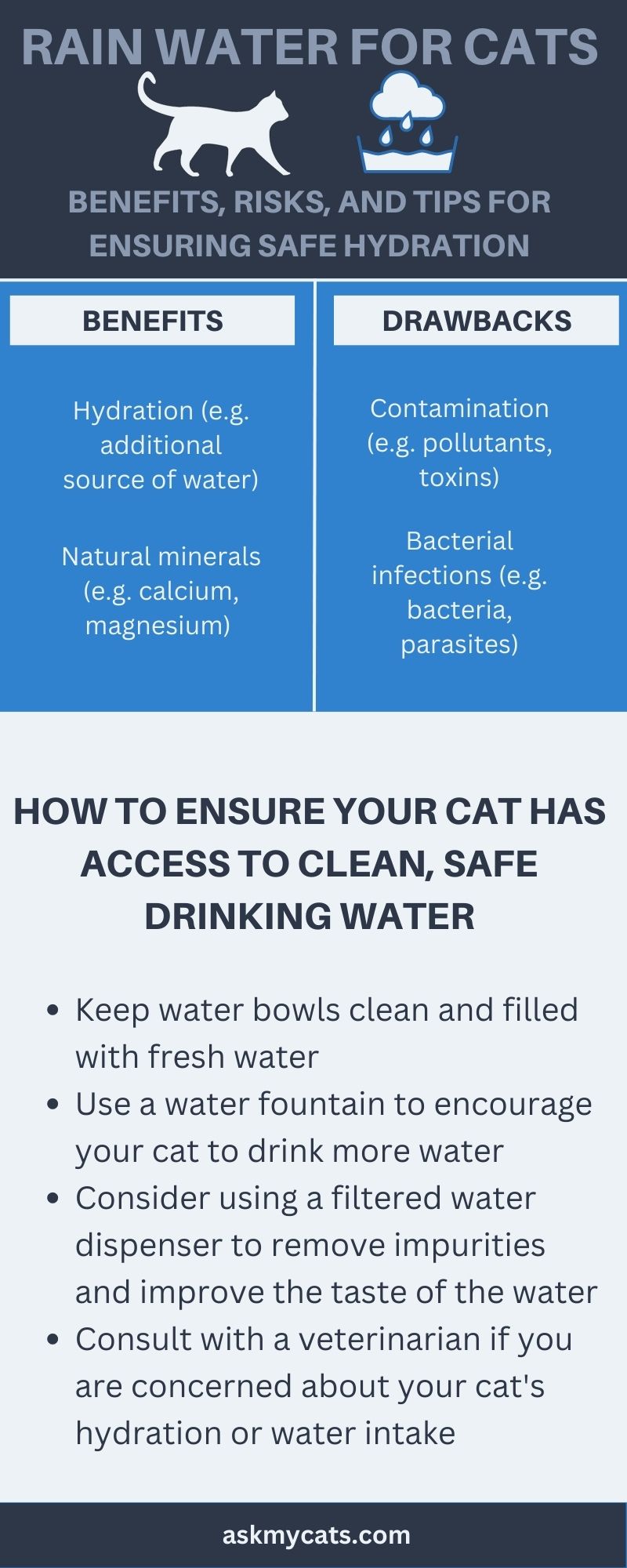
Rainwater may also appeal to cats, as they can perceive it with their acute hearing. It’s simpler for cats to locate rushing water using sound than it is for them to locate still water using sight.
Chemicals in the water can be detected by cats. A cat’s most dependable sense is the smell. The chemicals in tap water give it a distinct odor that a kitten’s acute nose will recognize right away, even if humans don’t notice them.
Drop your questions in the comments section below to resolve your queries!
Interesting Read: Can Cats Find Their Way Home After Rain?
